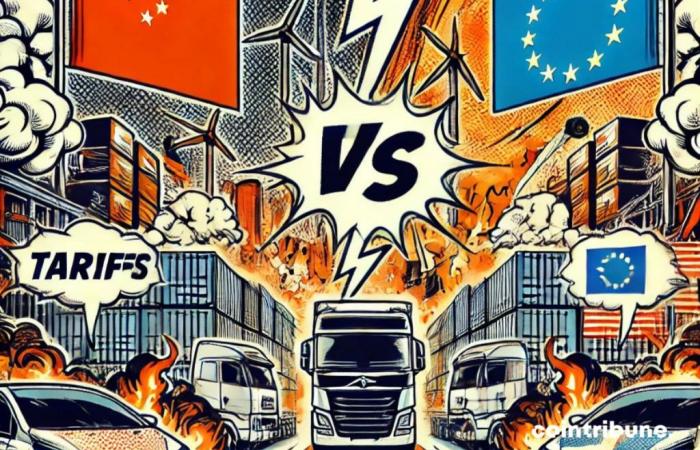9h00
4
min reading by
Luc Jose A.
A new front of economic tensions is opening between China and the European Union and threatens to upset the global trade balance. In response to EU proposals to impose tariffs on Chinese electric vehicles, influential BRICS member China has warned of the possibility of a trade war.
Escalation of trade frictions
China has expressed its dissatisfaction with the European Union’s decision to impose tariffs on Chinese electric vehicles. A spokesperson for China’s Ministry of Commerce warned that the move could trigger a trade war that ” the responsibility would fall entirely on the European side“. The statement comes after the EU proposed high tariffs on imports of electric vehicles from China, arguing that they benefit from unfair subsidies that distort competition. Beijing, for its part, criticizes these measures, calling them excessive and stressing that they could seriously disrupt economic relations between the two blocs.
The European Union justifies its proposals by claiming that Chinese electric vehicles are flooding the market at artificially low prices thanks to massive subsidies from the Chinese state, creating unfair competition for European manufacturers. This position has been firmly rejected by China, which sees it as an attempt at disguised protectionism. As a result, trade tensions between these two economic giants have intensified, raising fears of an escalation that could go well beyond the electric vehicle sector and affect all Sino-European trade.
BRICS strategic responses
In response to escalating tensions with the European Union, China and other BRICS members, such as Brazil, Russia, India and South Africa, are stepping up efforts to counter Western measures. The most notable initiative is dedollarization which aims to reduce their dependence on the US dollar by favoring the use of local currencies for international transactions. This strategy is seen as a way to strengthen their economic independence and protect their economies from fluctuations in the American market.
The potential implications of this confrontation are vast. If a trade war breaks out, it could disrupt not only the electric vehicle sector, but also all economic trade between China and the EU. European businesses could face retaliation in the form of tariffs or trade restrictions, worsening the already fragile economic situation of some industries. Furthermore, the acceleration of dedollarization efforts could modify the dynamics of international trade, and encourage other nations to join this initiative to reduce their own dependence on the American dollar.
Maximize your Cointribune experience with our ‘Read to Earn’ program! For every article you read, earn points and access exclusive rewards. Sign up now and start earning benefits.
Click here to join ‘Read to Earn’ and turn your passion for crypto into rewards!
Luc Jose A.
A graduate of Sciences Po Toulouse and holder of a blockchain consultant certification issued by Alyra, I joined the Cointribune adventure in 2019. Convinced of the potential of blockchain to transform many sectors of the economy, I took the commitment to raise awareness and inform the general public about this constantly evolving ecosystem. My goal is to enable everyone to better understand blockchain and seize the opportunities it offers. I strive every day to provide an objective analysis of current events, to decipher market trends, to relay the latest technological innovations and to put into perspective the economic and societal issues of this ongoing revolution.
DISCLAIMER
The comments and opinions expressed in this article are those of the author alone, and should not be considered investment advice. Do your own research before making any investment decisions.






